Washing sheets is one of those chores many of us put off for as long as possible. However, leaving household linens unwashed for too long can be extremely unsanitary, and even lead to sickness.
You might know how often you should wash your clothes, but now it's time to find out how often you should wash your sheets, kitchen towels, shower curtains and more.
Find out more and prevent a build-up of unwanted germs in your home...
STOP! Before continuing, be sure to sign up to the Expert Home Tips newsletter to get all the best home hacks, living tips, competitions and more.
1.How often to wash bed sheets
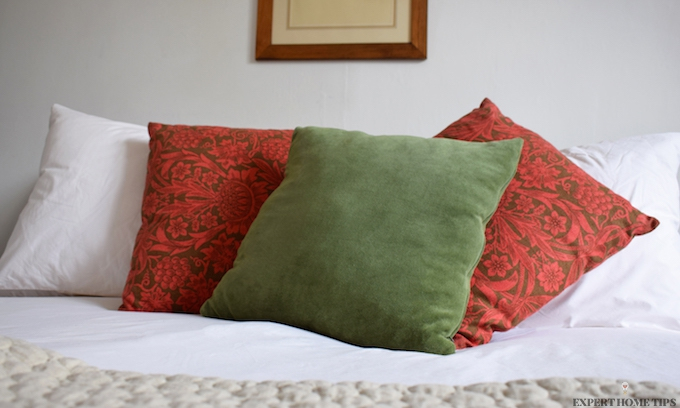
Sweating is the last thing you imagine yourself doing when you're in a deep, peaceful sleep, but we sweat a surprising amount every night.
In fact, our poor sheets have to put up with around 25ml of sweat per hour. When you consider we're supposed to get eight hours of kip a night, this soon starts to add up. Add to that our natural shedding of skin, and the warm environment which is ideal for dust mites, and it's easy to see how our beds can soon become a pretty filthy place to be.
You wouldn't wear your gym kit for weeks on end, so why would you want to sleep in the same sheets? You should wash your bed sheets once a week at 60˚C to kill mites and other bacteria.
TOP TIP: Don't make the bed! Pull back your bed linen every morning and open the windows to air our your bed. This will reduce humidity, helping to kill off dust mites.
2. How to clean a shower curtain
Curtains are something we consider more decorative than anything else. Shower curtains definitely don't fall into this category.
As the whole purpose of a shower curtain is to keep water from getting out, they spend most of their time wet. The humid environment of your bathroom also lessens their chances of drying out, which make mould and mildew buildup likely - yuck.
Such conditions provide ideal breeding conditions for germs, which is why it's so important to wash your shower curtain once a month.
Read the care label carefully to determine how to clean your shower curtain correctly. Use the hottest temperature possible to kill germs and keep your bathroom bacteria-free.
You're not going to believe this next one...
3. How often should you wash towels (kitchen)
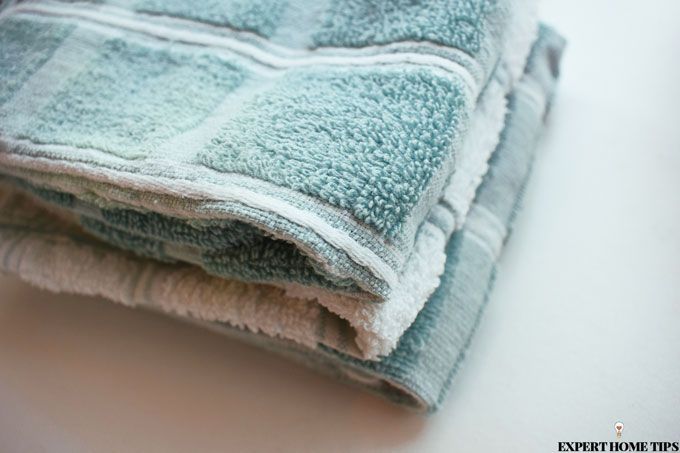
When was the last time you washed your kitchen towels? Although most people consider once a week to be enough, in reality, tea towels should be washed every day at 60˚C.
Raw meat and dirty vegetables carry a surprising amount of bacteria, which is easily transferred onto kitchen towels when knives, pots and pans are dried. Damp towels are often left to fester, which encourages germs to multiply rapidly. These germs can then be transferred onto hands, which can subsequently make us sick.
TOP TIP: Have a separate kitchen towel for drying hands. This will reduce the chance of germ transfer and prevent sickness in the home.
4. How to wash a duvet
Now we've got the bed sheets covered, it's time to get down to the nitty gritty - your duvet. There may be a duvet cover protecting it, but it's no match for sweat and dust mites.
Just like bed sheets, duvets should be washed regularly to keep your bed fresh. Thankfully it's not quite as regularly - duvets should be washed once every three months.
Learn how to wash a duvet correctly on the Persil site.
5. When to wash your bath & pedestal mats
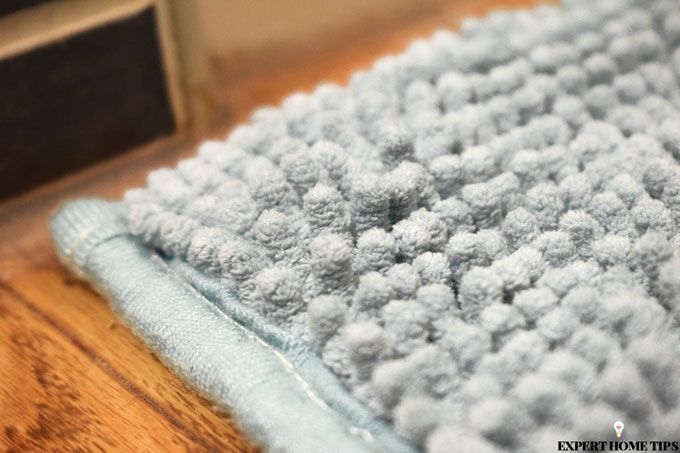
First thing's first - take a look down at your bathroom floor. Depending on who you live with and how often they use the bathroom will determine its condition.
Since bath and pedestal mats are on the floor, they rarely get a chance to dry out properly - cue germs and other bacteria. Pedestal mats suffer and even nastier fate, coming into contact with urine droplets and faeces particles more often than you'd care to imagine.
To combat all this, bath and, particularly, pedestal mats should be washed at least once a week, at a high temperature.
6. How often should you wash throws
Throw blankets definitely don't have to put up with as much as our sheets and duvets. However, that's not to say they don't need some TLC occasionally too.
Even throws only used for decorative purposes can be covered in dust, skin particles and dust mites. Keep your throws and blankets clean enough to cuddle up with on cold nights by washing them all once a season.
The material of your throws and blankets will determine the best washing method. Be sure to check the care instructions before you begin.
7. How to clean pillows
Another common household object that often gets neglected is our pillows. Just like duvets, these sumptuous squares of softness are faced with a surprising amount of sweat every night. If you're wondering why you keep waking up with a cold, or a spotty face, this could be why.
Pillows should be washed once every three months or so to keep them clean. Washing fibre, down and feather pillows is usually as easy as throwing them in the washing machine, although be sure to check the care instructions before doing so. It's only really foam pillows that you may struggle to wash.
Follow Nature's Sleep's guide to find the best way to clean your foam pillows at home today.
8. How often should you wash your towels? (bathroom)
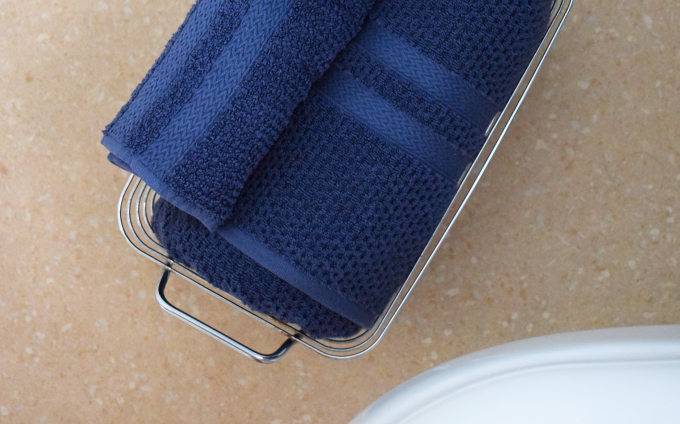
Clean body, clean towels, right? It may seem logical, but towels are dirtier than you'd imagine, even after their first use. This isn't anything to do with your washing method, it's actually your body that's to blame!
Every time we dry ourselves, the towel acts as an exfoliator, meaning hundreds of tiny dead skin cells are transferred onto it - yuck. Damp towels also provide the perfect environment for germs, and the longer we leave them, the more likely they are to multiply.
The answer? In an ideal world, you should wash your towels after every three uses at 60°C to keep them as germ-free as possible. For hand towels, it's every two days.
TOP TIP: if your towels are starting to smell particularly musty, throw in half a cup of baking soda with your load to freshen them up.
9. Washing dishcloths
This is a bit more of a personal one, as the type of dishcloth and preferred washing method varies from home to home. The Food Standards Agency recommends using disposable cloths wherever possible, and cleaning all others after every use.
Dishcloths are particularly important, as they are used on surfaces which may have bacteria from raw meat, poultry and eggs transferred onto them.
Extremely high wash temperatures, ideally of 90°C or above should be used to ensure dishcloths are completely disinfected.
TOP TIP: if you want to clean clothes by hand, we recommend first washing them in hot soapy water to remove excess grease and food, then soaking in a diluted bleach for an hour. This will also leave them looking spotless!
10. How to clean a washing machine
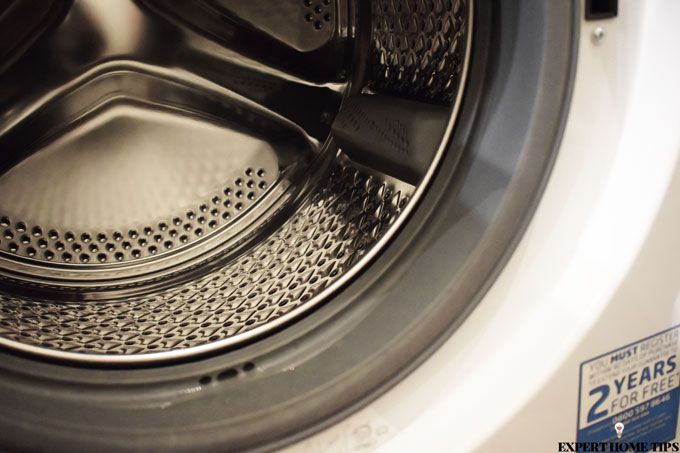
Now you know how often to wash household sheets, towels and other household linen for a super clean home. That's great - providing you're washing it in a clean washing machine!
The washing machine, much like the dishwasher, is something we presume doesn't need to be cleaned at all. However, hard water, detergents and even water alone can build-up and lead to nasty odours and even mould.
Give your washing machine a good clean every six months or so to keep it in good working order.
What are you guilty of not washing often enough? Let us know in the comments below!
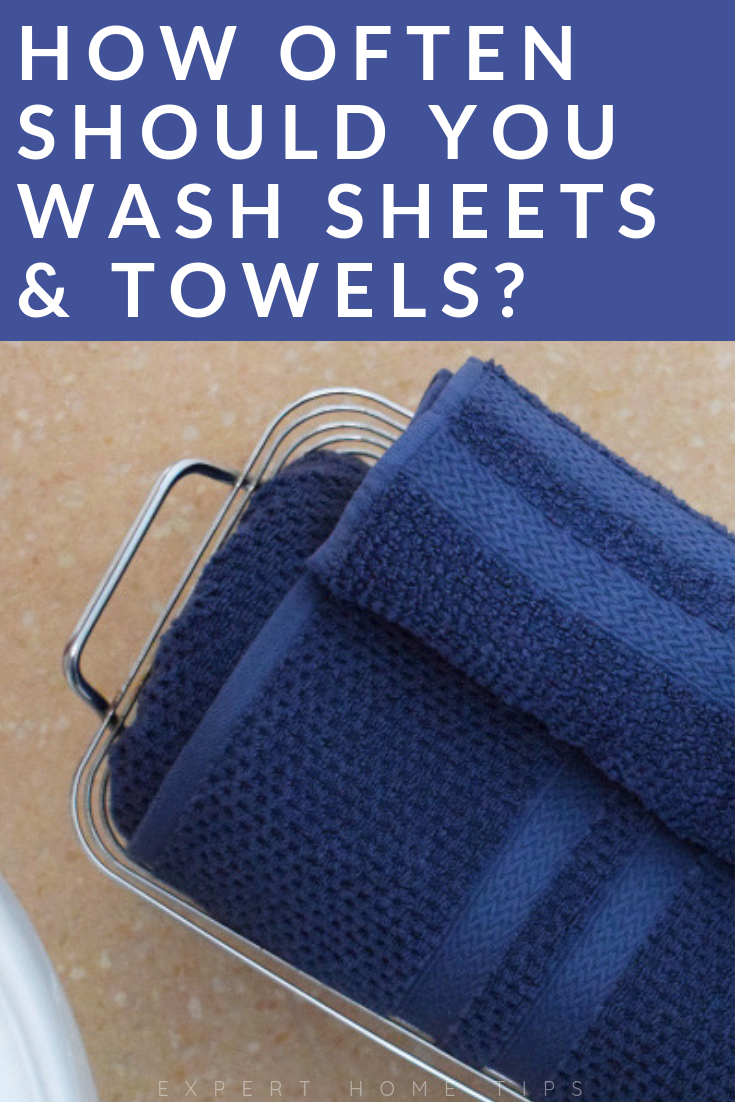
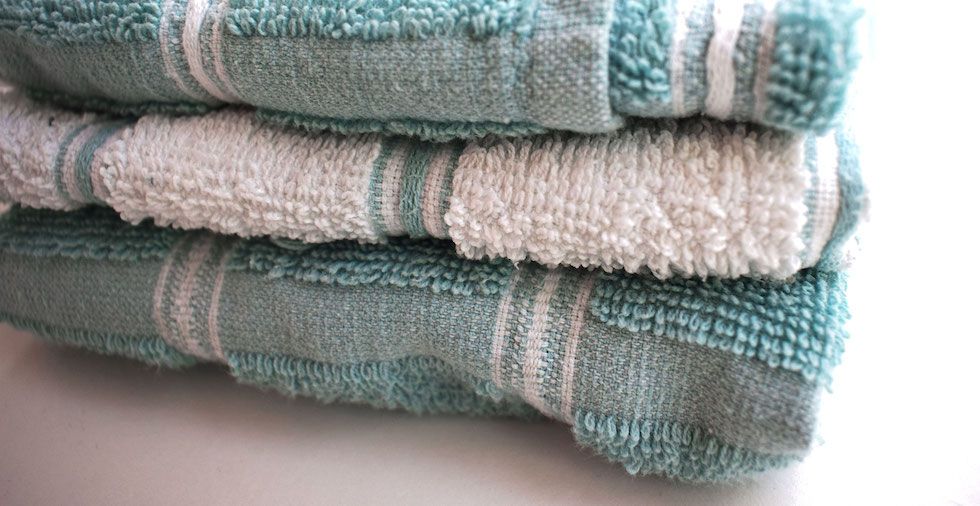
only cotton sheets can be washed at 60degrees. polycotton ones are washed at 40
Hi Christine. Thanks for pointing this out. Luckily, even if you wash at 40, modern detergents are strong enough to kill off most germs.
With the current wintery weather, it is hard enough getting one load of washing dry, the tumble dryer we have uses a lot of electric so we can't keep using that. Once a week for sheets when there is more than one or two people in the household isn't possible this time of year in England!
Hi Lucy. If you're struggling to wash/dry your sheets as often as recommended, it isn't the end of the world in Winter. Luckily, the colder temperatures are not ideal for germs, which such reduce the chance of them spreading. I'd also recommend airing your sheets as often as possible, by pulling back the covers and leaving the windows open each morning. I hope this helps :)
Most of these suggestions apply to people who don't work full time!!
Hi Alison! Yes, it can be very tricky to get the washing done when you work full-time. Perhaps we could make an adapted timetable for those that do.
It’s not too difficult to strip the bed before going to work. I sometimes forget I’ve done it and have to make it about 02.00 hrs!
We find making the bed the most tiring part!
Did you mean baking soda rather than baking powder? I would have thought baking powder would have left a gloopy residue, whereas baking soda would dissolve in water without a mess.
Hi Francis! You're correct - I'll make sure that gets amended. Baking powder would work in a pinch, as it contains baking soda, but it's much more expensive.
wonderful tips about washing Duvet's but how about washing Silk duvet's
Hi there! If you check the label, there should be care instructions. I believe the best practice would be to spot clean any spills and stains, but then take it to be professionally cleaned.
My biggest regret is that washing machines no longer have a 50 degree wash. I sometimes think 60 may be a bit too high for some things, & 40 too low for others. At least when 50 was available, you had the option of in-between for certain items. Does anyone else feel the same?
I know how you feel, Heather! 50 would be an ideal temperature.
It's interesting to see you recommend washing most items at 60°. It's now being suggested we use 30° in the interest of saving the planet, but I find that doesn't get the clothes clean. I personally have used 40° for many years, for everything except towels, tea towels and dishclothes, which all get washed at 90°. I put my washing machine on in the evening, empty it and hang the clothes out in the morning before going to work. If it's wet, a clothes airer in the kitchen or living room helps dry the clothes, but doesn't do much for the resulting condensation,
Hi Anne! Yes, unfortunately, a low temperature isn't always best for cleaning. I found the exact same problem when I tried a low-temperature wash.
As an extra tip.... a dishwasher tablet with plastic removed works well in a washing machine on a hot cycle to clean it. I have to put the tablet in the main compartment as it stays put, when placed in powder drawer
I've heard about this tip, but not tried it yet! Thanks for sharing, Toni.
Also Mouth Wash works well for cleaning a Washing Machine - works well tried it comes up fresh.
Using mouthwash to clean a washing machine is not recommended, as it may not be safe for use on appliances. Instead, it is best to use cleaning products specifically designed for washing machines to ensure proper cleaning and avoid any potential damage.
Here’s a tip for drying towels or throws or even duvets and covers, I use my banister that goes along our upstairs landing. The towels we always air on the banister after using and they dry so quickly. Drying duvet covers can dry but we have to fold the cover so it doesn’t drag on the floor and then the other side hangs down freely so any air dries up through. It definitely helps if the weather has been bad and big items need to dry otherwise your dirty washing builds up and I don’t like having a basket of smelly washing filling up
Bannisters are great for hanging linens if you have one! Great tip, Michelle.
I put my dishcloth into the microwave on high for 4 minutes; kills any the bacteria. Also soak sponges, scourers etc in hot water with bleach overnight.
Great idea - as long as the sponge doesn't have metal in it (like a scourer)!
Don't use bleach with hot water as it renders it ineffective. Only use with cold water.
That's true - hot water can make bleach less effective for cleaning because high temperatures can cause the bleach to degrade. Therefore, it is recommended to use water at room temperature or cool when using bleach for cleaning.
I’ve been drying all my washing on an upstairs line for many years! I’m disabled so hanging out washing in the garden was a no-no for me! I have two lines running the length of my landing, I put clothes on hangers and sheets and duvets covers hang over the line and are dry overnight! I also have a clothes horse in spare bedroom for underwear and socks. I know people say how nice washing smells when dryer outside, but with a nice conditioner my washing smells lovely!
It could be worth getting a dehumidifier to help speed up drying time? I found this also made my clothes smell even better!
I can't believe that so many people are drying wet clothes in rooms that are used constantly. I dry outside when possible even though in the winter it is difficult, but even a hour in the fresh air can help. As a last resort I place a clothes aired in the bath and leave the window open during the day.
That's a good idea! If I do dry indoors, I keep a dehumidifier running.
Don't use bleach unless it is unavoidable - dishcloths can be cleaned and sterilised easily by pouring a little water from the kettle onto them,every time you have boiled a bit more than you need for a cup of tea - no need for chemicals and you are avoiding wasting the heat used to boil the kettle...
Great idea! I like to use Zoflora to disinfect my cloths every day.
I popped my moppets and minky in the dishwasher tonight. I thought I’d try a new way to get them clean and sterile. I’ll see how they turn out in the morning.
Sounds like a good idea!
since the Covid started i have a pile of facecloths on the landing and in the kitchen, when you wash your hands use one then throw it in the washer or in a bucket upstair, they are esier to keep washing when you have enough or if running out to put them all in the washer with anything else that may need a quick wash, as they wont be to dirty if you have just wash your hands, great for kids they can make a game of it. Only trouble is I need some new ones washing constantly they wear out faster.
Thanks for sharing!
Whenever I have washed pillows they always become lumpy
To prevent pillows from becoming lumpy when you wash them, use a pillow protector, fluff the pillow before placing it in the washing machine, use a mild detergent, and wash the pillow on a gentle cycle. Once the wash cycle is complete, fluff the pillow again and place it in the dryer on a low-heat setting with a few clean tennis balls, then take the pillow out of the dryer and fluff it again before using it.
Thank goodness we are doing this correctly. I do not own a washing machine I have a tiny kitchen so all our washing is done by hand. We wash the bedding every tuesday iron it on wednesday. All towels are done every 3 days. We are both nearly 80
That sounds great, Anne!
All this would be fine if we weren't in a cist of living crisis and climate emergency. Unfortunately, many people can't afford to put their heating on, let alone the washing machine. And trying to dry items without a tumble can lead to black mould that comes with far more serious health issues than not washing sheets every week does. Some of the tips I like, folding back the covers to air the bed and reduce dust mites, for example. I'd suggest using towels that are as small as possible (I dry my body with a face cloth after showering - I wash it after the one use, and use a hand towel to dry my hair which is washed once a week), When the weather is dry, letting a duvet air on an outside washing line, pillows too, helps to freshen them up. Down pillows and feathers encourage dust mites where as wool duvets and pillows repel dust mites, reduce sweating and are breathable. They aren't cheap but a good choice in ghe long term when the time comes to replace current ones...they are usually more sustainable than the alternatives too! I'd love to see an article that's more sensitive to environmental challenges and the financial pressures people are under Right now!
Thanks for sharing, Wendy! Acknowledging that not everyone can afford expensive or environmentally friendly products and practices is essential. Cost-effective and sustainable tips such as using small towels and air-drying bedding can help reduce our environmental impact while being accessible to all.